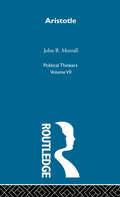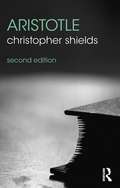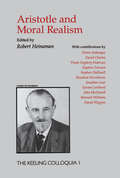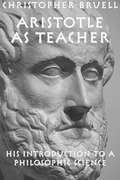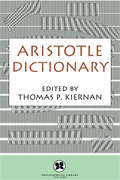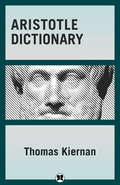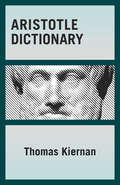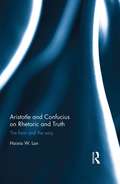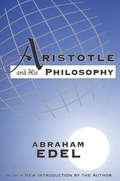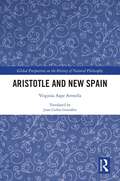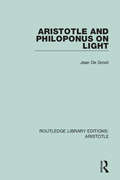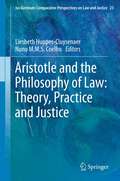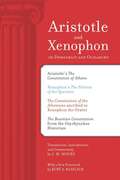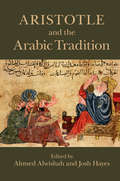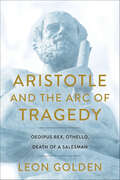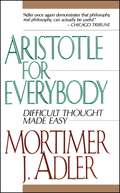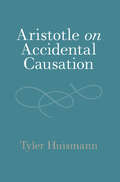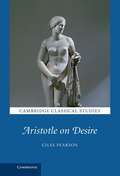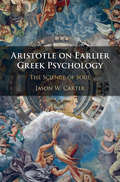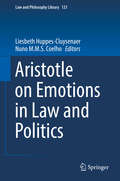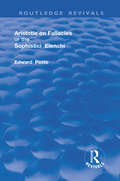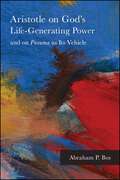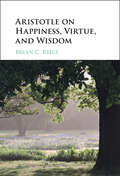- Table View
- List View
Aristotle
by Brad Inwood Raphael WoolfAristotle's Eudemian Ethics has been unjustly neglected in comparison with its more famous counterpart the Nicomachean Ethics. This is in large part due to the fact that until recently no complete translation of the work has been available. But the Eudemian Ethics is a masterpiece in its own right, offering valuable insights into Aristotle's ideas on virtue, happiness and the good life. This volume offers a translation by Brad Inwood and Raphael Woolf that is both fluent and exact, and an introduction in which they help the reader to gain a deeper understanding both of the Eudemian Ethics and of its relation to the Nicomachean Ethics and to Aristotle's ethical thought as a whole. The explanatory notes address Aristotle's many references to other works, people and events. The volume will be of interest to students and scholars of the history of ethics, ancient and moral philosophy, and Aristotle studies.
Aristotle
by John B. MorrallFirst published in 1977 this volume is the only account published in English in the 20th century to be exclusively devoted to an interpretation of Aristotle's political thought (as distinct from commentaries, translations and works on Aristotelean philosophy in general). It places Aristotle in his background of the Greek political experience.
Aristotle (The Routledge Philosophers)
by Christopher ShieldsIn this extensively revised new edition of his excellent guidebook, Christopher Shields introduces the whole of Aristotle’s philosophy, showing how his powerful conception of human nature shaped much of his thinking on the nature of the soul and the mind, ethics, politics, and the arts. Beginning with a brief biography, Shields carefully explains the fundamental elements of Aristotle’s thought: his explanatory framework, his philosophical methodology, and his four-causal explanatory scheme. Subsequently he discusses Aristotle’s metaphysics, the theory of categories, logical theory, and his conception of the human being as a composite of soul and body. The last part concentrates on Aristotle’s value theory as applied to ethics and politics, and assesses his approach to happiness, virtue, and the best life for human beings, before turning to a consideration of Aristotle's theory of rhetoric and the arts, with a special focus on his perennially controversial treatment of tragedy. This second edition includes an expanded discussion of Aristotle's method, and new sections on key issues in perception, thought, akrasia, and mimesis. It concludes with an expanded assessment of Aristotle's legacy, sketching currently emerging Neo-Aristotelian movements in metaphysics and virtue ethics.
Aristotle And Moral Realism: The Proceedings Of The First Keeling Colloquium, University College London, February 1994 (Keeling Colloquia Ser. #Vol. 1)
by Robert A HeinamanThe question of moral realismwhether our ethical beliefs rest on some objective foundationis one that mattered as much to Aristotle as it does to us today, and his writings on this topic continue to provide inspiration for the contemporary debate. This volume of essays expands the fruitful conversation among scholars of ancient philosophy and contemporary ethical theorists on this question and related issues such as the virtues, justice, and Aristotles theory of tragedy. }The question of moral realismwhether our ethical beliefs rest on some objective foundationis one that mattered as much to Aristotle as it does to us today, and his writings on this topic continue to provide inspiration for the contemporary debate. This volume of essays expands the fruitful conversation among scholars of ancient philosophy and contemporary ethical theorists on this question and related issues such as the virtues, justice, and Aristotles theory of tragedy. The distinguished contributors to this volume enrich and clarify both Aristotles views and the contemporary debates. This book makes an important contribution to both topics, and it will be essential reading for all philosophers and classicists with an interest in moral philosophy and Greek ethics.
Aristotle As Teacher: His Introduction To A Philosophic Science
by Christopher BruellThis book is an account of Aristotle's Metaphysics. The work is considered as a whole and each of its parts or books is taken up in the order that it has in the traditional text. The book is based on an examination of all of the manuscript readings reported in the three most recent editions of the work (those of Christ, Ross, and Jaeger), and it attempts in this way and others to come as close as possible to what would have been the original text. The Metaphysics is of course a much-studied work. What distinguishes this new effort to understand it is the working assumption that Aristotle presents in it his most comprehensive reflection on science: its character and aims, its foundations or presuppositions, and the obstacles or objections that constitute a challenge to its possibility. The book is thus intended to be of interest and use to at least two classes of readers: to those who have already reflected themselves on the nature of science and who have perhaps become dissatisfied with more recent attempts to establish it on a firm basis or to explain the basis on which it rests; and to beginning students who are willing to undertake a difficult task and who can be brought to see that science and philosophy were originally equivalent terms and that the effort to distinguish or separate them may have been deeply misguided. In other words, the book is meant to afford a glimpse into what philosophy originally meant.
Aristotle Dictionary
by Thomas P. Kiernan Dagobert D. RuneAt long last a comprehensive tool in English for a better understanding of the most basic terms in Aristotle's philosophy. Interested readers, students and scholars of philosophy and of the general intellectual background of Western culture need no longer be handicapped by a lack of knowledge of Greek and Latin. A careful comparison of the original Greek, medieval and Renaissance Latin translations and a reappraisal of English usage make this work a definitive source for the precise grasp of what has been the historical Aristotle as far as the documents permit one to judge. Third Printing
Aristotle Dictionary
by Thomas KiernanAt long last a comprehensive tool in English for a better understanding of the most basic terms in Aristotle's philosophy. Interested readers, students and scholars of philosophy and of the general intellectual background of Western culture need no longer be handicapped by a lack of knowledge of Greek and Latin. A careful comparison of the original Greek, Medieval and Renaissance Latin translations and a reappraisal of English usage make this work a definitive source for the precise grasp of what has been the historical Aristotle as far as the documents permit one to judge. A lengthy introduction by Professor Theodore E. James presents an analysis of the major works of Aristotle.
Aristotle Dictionary
by Thomas KiernanAt long last, a comprehensive tool in English for a better understanding of the most basic terms in Aristotle&’s philosophy. Interested readers, students, and scholars of philosophy and of the general intellectual background of Western culture need no longer be handicapped by a lack of knowledge of Greek and Latin. A careful comparison of the original Greek, Medieval, and Renaissance Latin translations and a reappraisal of English usage make Aristotle Dictionary a definitive source for the precise grasp of what has been the historical Aristotle as far as the documents permit one to judge. A lengthy introduction by Professor Theodore E. James presents an analysis of the major works of Aristotle.
Aristotle and Confucius on Rhetoric and Truth: The Form and the Way
by Haixia LanThe current study argues that different cultures can coexist better today if we focus not only on what separates them but also on what connects them. To do so, the author discusses how both Aristotle and Confucius see rhetoric as a mode of thinking that is indispensable to the human understanding of the truths of things or dao-the-way, or, how both see the human understanding of the truths of things or dao-the-way as necessarily communal, open-ended, and discursive. Based on this similarity, the author aims to develop a more nuanced understanding of differences to help foster better cross-cultural communication. In making the argument, she critically examines two stereotyped views: that Aristotle’s concept of essence or truth is too static to be relevant to the rhetorical focus on the realm of human affairs and that Confucius’ concept of dao-the-way is too decentered to be compatible with the inferential/discursive thinking. In addition, the author relies primarily on the interpretations of the Analects by two 20th-century Chinese Confucians to supplement the overreliance on renderings of the Analects in recent comparative rhetorical scholarship. The study shows that we need an in-depth understanding of both the other and the self to comprehend the relation between the two.
Aristotle and His Philosophy
by Abraham EdelIn this stunning act of synthesis, Abraham Edel captures the entire range of Aristotle's thought in a manner that will prove attractive and convincing to a contemporary audience. Many philosophers approach Aristotle with their own, rather than his, questions. Some cast him as a partisan of a contemporary school. Even the neutral approach of classical scholarship often takes for granted questions that reflect our modern ways of dissecting the world.Aristotle and His Philosophy shows him at work in asking and answering questions. Abraham Edel fashions a sound comparative way of using current analysis to deepen our understanding of Aristotle rather than argue with or simply appropriate him. Edel examines how Aristotle's basic ideas operated in his scientific and humanistic works, what they enabled him to do, what they kept him from doing, and what in turn we can learn from his philosophical experimentation.The purpose of this volume is twofold: to provide a comprehensive introduction to Aristotle's thought, and to throw fresh light on its patterned and systematic character. First, tracing the pattern in Aristotle's metaphysical and physical writings, he then explores the psychology, epistemology, ethics and politics, rhetoric and poetics. In the process, Edel discusses the way interpretations of Aristotle are built up and how different philosophical outlooks Catholic, Hegelian, Marxian, linguistic, naturalistic, and pragmatic have affected the reading of Aristotelian texts and ideas.The new introduction probes the general problem of interpreting a philosophy, and suggests how working through the different interpretations can contribute to a fuller understanding. This methodological self-consciousness makes Aristotle and His Philosophy markedly different from other studies of Aristotle. Martha C. Nussbaum of Brown University has described Edel as having "philosophical sensitivity and good sense throughout. His scholarship is comprehensive, but handled with grace and clarity."
Aristotle and New Spain (Global Perspectives on the History of Natural Philosophy)
by Virginia Aspe ArmellaThis book is a detailed exploration of the Hispanic intellectual context and the different Aristotelian traditions that prevailed until the 16th century. Through a review and contextualisation of Aristotelian thinkers and texts, it argues that a unique Aristotelian tradition was formed in New Spain.The characteristic differences of Novohispanic Aristotelianism are a consequence of five factors: contact with the autochthonous cultures of America, the impact of the colonial organisation, the influence of the Salamanca humanist tradition, the presence of the Italian Aristotelianism of Renaissance translators in the university curricula and in the intellectual polemics of the time, and a peculiar assimilation of primitive and Old Testament Christianity in relation to indigenous people. This book analyses the works of Alonso de la Veracruz, Bartolomé de las Casas, Bernardino de Sahagún, Sor Juana Inés de la Cruz, Carlos de Sigüenza y Góngora, and Francisco Xavier Clavijero, reconsidering them in light of the history of ideas in New Spain and the contributions of Byzantine translators. It also offers a reflection on the problem of addressing Mexican colonial sources.This volume will be of interest to undergraduate and postgraduate philosophy students, as well as to researchers focused on Aristotle, Renaissance philosophy, or Latin American studies.
Aristotle and Philoponus on Light (Routledge Library Editions: Aristotle #3)
by Jean De GrootOriginally published in 1991. Philoponus’ long commentary on Aristotle’s definition of light sets up the major concerns, both in optics and theory of light, that are discussed here. Light was of special interest in Neoplatonism because of its being something incorporeal in the world of natural bodies. Light therefore had a special role in the philosophical analysis of the interpenetration of bodies and was also a paradigm for the soul-body problem. The book contains much about the physiology of vision as well as the propagation of light. Several chapters investigate the philosophical theory behind what came to be known as ‘multiplication of species’ in medieval light theory. These issues in the history of science are placed within an analysis of Neoplatonic development of the distinction between Aristotle’s kinesis and energeia. The book treats Philoponus’ philosophy of mathematical science from the point of view of matter, quantity, and three-dimensionality.
Aristotle and The Philosophy of Law: Theory, Practice And Justice (Ius Gentium: Comparative Perspectives on Law and Justice #23)
by Nuno M.M.S. Coelho Liesbeth Huppes-CluysenaerThe book presents a new focus on the legal philosophical texts of Aristotle, which offers a much richer frame for the understanding of practical thought, legal reasoning and political experience. It allows understanding how human beings interact in a complex world, and how extensive the complexity is which results from humans' own power of self-construction and autonomy. The Aristotelian approach recognizes the limits of rationality and the inevitable and constitutive contingency in Law. All this offers a helpful instrument to understand the changes globalisation imposes to legal experience today. The contributions in this collection do not merely pay attention to private virtues, but focus primarily on public virtues. They deal with the fact that law is dependent on political power and that a person can never be sure about the facts of a case or about the right way to act. They explore the assumption that a detailed knowledge of Aristotle's epistemology is necessary, because of the direct connection between Enlightened reasoning and legal positivism. They pay attention to the concept of proportionality, which can be seen as a precondition to discuss liberalism.
Aristotle and Xenophon On Democracy and Oligarchy
by J. M. MooreThis collection contains: Aristotle's "The Constitution of Athens"; Xenophon's "The Politeia of the Spartans"; "The Constitution of the Athenians" ascribed to Xenophon the Orator; and, "The Boeotian Constitution" from the Oxyrhynchus Historian. In bringing together, translating, and annotating these constitutional documents from ancient Greece thirty-five years ago, J.M. Moore produced an authoritative work of the highest scholarship. There is an explanatory essay by classics scholar Kurt A. Raaflaub that expands this indispensable collection.
Aristotle and the Arabic Tradition
by Ahmed Alwishah Josh HayesThis volume of essays by scholars in ancient Greek, medieval, and Arabic philosophy examines the full range of Aristotle's influence upon the Arabic tradition. It explores central themes from Aristotle's corpus, including logic, rhetoric and poetics, physics and meteorology, psychology, metaphysics, ethics and politics, and examines how these themes are investigated and developed by Arabic philosophers including al-Kindî, al-Fârâbî, Avicenna, al-Ghazâlî, Ibn Bâjja and Averroes. The volume also includes essays which explicitly focus upon the historical reception of Aristotle, from the time of the Greek and Syriac transmission of his texts into the Islamic world to the period of their integration and assimilation into Arabic philosophy. This rich and wide-ranging collection will appeal to all those who are interested in the themes, development and context of Aristotle's enduring legacy within the Arabic tradition.
Aristotle and the Arc of the Tragedy: Oedipus Rex, Othello, Death of a Salesman
by Leon GoldenAristotle and the Arc of Tragedy is the latest of Leon Golden’s books to connect Ancient Greece to modern culture. In a world facing many pressing issues Classics professor Golden wants to champion the values and achievements of Classical Civilization. He asserts that Homeric Epic and Greek Tragedy are as relevant today as they were millennia ago because they are riveting and insightful studies of the human condition. Their universality grants them a contemporary relevance despite the passage of time and changes in custom and taste.In one of his previous books, Understanding the Iliad, Golden illuminated the relevance of The Iliad for modern readers. The Bryn Mawr Classical Review praised Understanding the Iliad because it, “achieves what it sets out to accomplish: to provide an interpretation of the Iliad that emphasizes its didactic aspects, its ability to improve its readers by presenting the spectacle of the evolution of a flawed warrior consumed by destructive anger to a legitimate hero who transcends his narcissism and grandiosity and reaches out to others and by doing so heals his own aching soul in the process.”Golden, making use of correspondence and personal contact with Joseph Heller, himself, argues convincingly in Achilles and Yossarian that Homer’s The Iliad exerted a profound influence over Heller as he wrote his modern classic, Catch-22. A Kirkus review acclaims Achilles and Yossarian in these words: “Golden combines impressive erudition with a sharp critical eye and a lucid prose style that laymen will find accessible and engaging. The result is an original and persuasive work of literary scholarship that finds much more than mere war stories in these classics.”
Aristotle for Everybody
by Mortimer J. AdlerAristotle (384 - 322 B.C.) taught logic to Alexander the Great and, by virtue of his philosophical works, to every philosopher since, from Marcus Aurelius, to Thomas Aquinas, to Mortimer J. Adler. Now Adler instructs the world in the "uncommon common sense" of Aristotelian logic, presenting Aristotle's understandings in a current, delightfully lucid way. He brings Aristotle's work to an everyday level. By encouraging readers to think philosophically, Adler offers us a unique path to personal insights and understanding of intangibles, such as the difference between wants and needs, the proper way to pursue happiness, and the right plan for a good life.
Aristotle on Accidental Causation
by Tyler HuismannIn this major new study, Tyler Huismann connects Aristotle's natural philosophy to modern theories of causation and provides fresh interpretations of classic issues. He links two of the most important notions in Aristotle's philosophy, accidents and causes, and using the concept of accidental causation as a guide, argues for ground-breaking proposals on some of the most foundational areas of Aristotle's thought: the relation between substances and accidents, the nature of efficient causation, the workings of 'qua,' the possibility of uncaused events, and the role of accidental causation in the natural world. Structured around close readings of Aristotle's Physics and Metaphysics and informed by contemporary theories of causation, Huismann's book offers students an accessible treatment of some of Aristotle's core texts, and provides specialists with a series of provocative interpretations.
Aristotle on Desire
by Giles PearsonDesire is a central concept in Aristotle's ethical and psychological works, but he does not provide us with a systematic treatment of the notion itself. This book reconstructs the account of desire latent in his various scattered remarks on the subject and analyses its role in his moral psychology. Topics include: the range of states that Aristotle counts as desires (orexeis); objects of desire (orekta) and the relation between desires and envisaging prospects; desire and the good; Aristotle's three species of desire: epithumia (pleasure-based desire), thumos (retaliatory desire) and boulêsis (good-based desire – in a narrower notion of 'good' than that which connects desire more generally to the good); Aristotle's division of desires into rational and non-rational; Aristotle and some current views on desire; and the role of desire in Aristotle's moral psychology. The book will be of relevance to anyone interested in Aristotle's ethics or psychology.
Aristotle on Earlier Greek Psychology: The Science of Soul
by Jason W. CarterThis volume is the first in English to provide a full, systematic investigation into Aristotle's criticisms of earlier Greek theories of the soul from the perspective of his theory of scientific explanation. Some interpreters of the De Anima have seen Aristotle's criticisms of Presocratic, Platonic, and other views about the soul as unfair or dialectical, but Jason W. Carter argues that Aristotle's criticisms are in fact a justified attempt to test the adequacy of earlier theories in terms of the theory of scientific knowledge he advances in the Posterior Analytics. Carter proposes a new interpretation of Aristotle's confrontations with earlier psychology, showing how his reception of other Greek philosophers shaped his own hylomorphic psychology and led him to adopt a novel dualist theory of the soul–body relation. His book will be important for students and scholars of Aristotle, ancient Greek psychology, and the history of the mind–body problem.
Aristotle on Emotions in Law and Politics (Law and Philosophy Library #121)
by Nuno M.M.S. Coelho Liesbeth Huppes-CluysenaerIn this book, experts from the fields of law and philosophy explore the works of Aristotle to illuminate the much-debated and fascinating relationship between emotions and justice.<P><P> Emotions matter in connection with democracy and equity – they are relevant to the judicial enforcement of rights, legal argumentation, and decision-making processes in legislative bodies and courts. The decisive role that emotions, feelings and passions play in these processes cannot be ignored – not even by those who believe that emotions have no legitimate place in the public sphere. A growing body of literature on these topics recognizes the seminal insights contributed by Aristotle. This book offers a comprehensive analysis of his thinking in this context, as well as proposals for inspiring dialogues between his works and those written by a selection of modern and contemporary thinkers. As such, the book offers a valuable resource for students of law, philosophy, rhetoric, politics, ethics and history, but also for readers interested in the ongoing debate about legal positivism and the relevance of emotions for legal and political life in today’s world. <P> Explains how Aristotle’s attention to the non-rational elements of cognition contributes to his realistic views on the rule of law, social cohesion, democracy and judgment.<P> Re-appraises Aristotle’s biological view on the continuity between human and animal life.<P> Shows the striking similarity between the views of contemporary neuro-scientists and Aristotle’s thoughts on emotion.<P> Examines many of Aristotle’s writings such as Nicomachean Ethics, Politics, Rhetoric and Metaphysics.<P> Presents the outcomes of several years of interdisciplinary collaboration between ancient philosophy scholars, legal theorists, political scientists and historians
Aristotle on Fallacies; or The Sophistici Elenchi (Routledge Revivals)
by Edward PosteFirst published in 1866, Aristotle on fallacies; or the Sophistici Elenchi, Poste explains Aristotles explanation of the nature of fallacies, if not satisfactory, seems to be as compete and intelligible as any that has since been offered.
Aristotle on God's Life-Generating Power and on Pneuma as Its Vehicle (SUNY series in Ancient Greek Philosophy)
by Abraham P. BosIn this deep rethinking of Aristotle's work, Abraham P. Bos argues that scholarship on Aristotle's philosophy has erred since antiquity in denying the connection between his theology and his doctrine of reproduction and life in the earthly sphere. Beginning with an analysis of God's role in the Aristotelian system, Bos explores how this relates to other elements of his philosophy, especially to his theory of reproduction. The argument he develops is that in talking about the cosmos, Aristotle rejected Plato's metaphor of artisanal production by a divine Demiurge in favor of a biotic metaphor based on the transmission of life in reproduction, in which pneuma—not breath as it is often interpreted but the life-bearing spirit in animals and plants—plays a key and sustaining role as the vital principle in all that lives. In making this case, he defends the authenticity of the treatises De Mundo and De Spiritu as Aristotle's, and demonstrates Aristotle's works as a unified system that sharply and comprehensively refutes Plato's, and in particular replaces Plato's doctrine of the soul with a theory in which the soul is clearly distinguished from the intellect.
Aristotle on Happiness, Virtue, and Wisdom
by Bryan C. ReeceAristotle thinks that happiness is an activity – it consists in doing something – rather than a feeling. It is the best activity of which humans are capable and is spread out over the course of a life. But what kind of activity is it? Some of his remarks indicate that it is a single best kind of activity, intellectual contemplation. Other evidence suggests that it is an overarching activity that has various virtuous activities, ethical and intellectual, as parts. Numerous interpreters have sharply disagreed about Aristotle's answers to such questions. In this book, Bryan Reece offers a fundamentally new approach to determining what kind of activity Aristotle thinks happiness is, one that challenges widespread assumptions that have until now prevented a dialectically satisfactory interpretation. His approach displays the boldness and systematicity of Aristotle's practical philosophy.
Aristotle on Homonymy
by Julie K. WardJulie K. Ward examines Aristotle's thought regarding how language informs our views of what is real. First she places Aristotle's theory in its historical and philosophical contexts in relation to Plato and Speusippus. Ward then explores Aristotle's theory of language as it is deployed in several works, including Ethics, Topics, Physics, and Metaphysics, so as to consider its relation to dialectical practice and scientific explanation as Aristotle conceived it.

